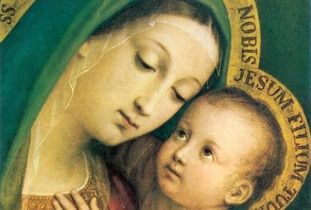Feb. 1, 2019
THE MERIT OF SUFFERINGS
Let us ask Our Lady of Good Counsel to teach us to suffer meritoriously for the restoration of the Seat of Saint Peter to the Pope in Exile, Gregorius XVIII, for the conversion of sinners, and in expiation for our sins.
The Prophecy:
“My children, my Divine Son prefers pains and sufferings to all good works and to all the charitable acts that you can make. All sufferings have been His spouses.”
--Oh! Dear Mother, the Saviour was All-Powerful. We are nothing but poor human hearts, so fragile and so light!
“It is true, my children, that you have of yourselves fragility, and that my Divine Son is God. But know that living on earth and because of the stain of original sin, your sorrows are infinitely greater in the eyes of God.”
--Good Mother, it is necessary to have the courage of the Good God to be able to endure all of these sufferings. I hope that you will forgive us—we are no more than feeble creatures—but do not our complaints cause us further suffering?
“No, my children. My Dear Son said, ‘Ask and you shall receive.’ ”
(3 December 1877)
[Source: page 190, Le ciel en colloque avec Marie-Julie Jahenny, by Fr. Pierre Roberdel].
Reflections on this vision :
Our sufferings have meaning, if they are united to Christ's sufferings on the Cross. In this way they have meaning and spiritual value for our souls.
This is why the Blessed Virgin Mother of God says, “[M]y Divine Son prefers pains and sufferings to all good works and to all the charitable acts that you can make.”
And so it is that “All sufferings have been His spouses.”
Yes, God knows our spiritual sorrows: “you have of yourselves fragility, … But know that living on earth and because of the stain of original sin, your sorrows are infinitely greater in the eyes of God.”
Our Lord knows our “fragility”: our tendency to be stupid and blundering, so often incapable of reasoning rightly and seeing the Truth.
But there is a beauty in even the most unaware individual, and this beauty is two-fold: first, we are made in the Image of God, and secondly, we have the ability to see error, repent, and change our ways.
God knows us intimately because He made us in His own Image.
He knows that life on earth is hard, that our divine souls will be burdened at times and, at other times, find difficult obstacles to a holy life that is lived for Him alone.
He knows the spiritual attacks that we suffer, which can knock us backward so that we have to begin again.
And because God gave us infinite souls, in His Image, our sufferings “are infinitely greater in the eyes of God.”
Marie-Julie’s question is deeply theological: “[D]o not our complaints cause us further suffering?”
In other words, are we not punished for complaining about sufferings which our fallen nature rightly deserves as punishment for our sins?
Our Blessed Mother answers sublimely, by quoting the words of Christ Himself: “Ask and you shall receive.”
It is as if God views our complaints in the same way that an earthly father views the complaints of his distressed child: as an alert that his help is needed immediately.
Christ told us to call God, 'Father'.
God is Love. The Sacred Heart of Jesus shows His burning Love for us.
The words of the Blessed Virgin Mary tell us that He will hear us!
So let each of us ask, without ceasing, that for which our hearts hunger:
+ the conversion of those whom we love
+ the grace to live a holy life and die a holy death
+ the public restoration of the “See of the most holy Peter and the Chair of Truth for the light of the world” [Prayer to Saint Michael]
Why the latter?
Because the restoration of the Reign of the Vicar of Christ, administering to our needs from the Chair of Truth, are the necessary elements for God’s sacramental graces to flow over us once again, to wash us of our blindness and our attachment to sins.
Behold the Cross of the Lord; be scattered ye hostile powers!
LINKS: St. Michael Prayer The See of the Cross Pope Gregory XVII The Great Crisis
"We declare, say, define and proclaim to every human creature that they by necessity for salvation are entirely subject to the Roman Pontiff ." - Decree of Pope Boniface VIII, Unam Sanctam, Nov. 18, 1302, ex cathedra
